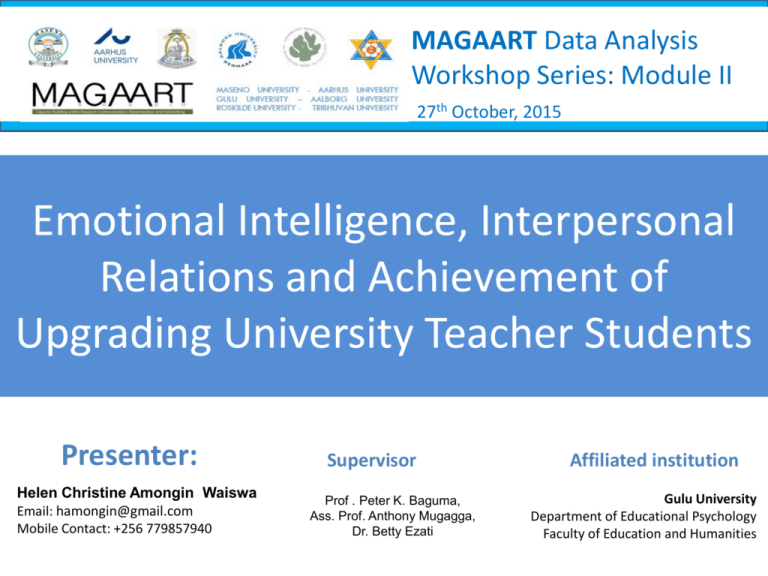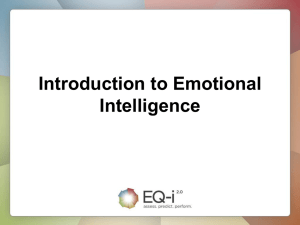
MAGAART Data Analysis
Workshop Series: Module II
27th October, 2015
Emotional Intelligence, Interpersonal
Relations and Achievement of
Upgrading University Teacher Students
Presenter:
Helen Christine Amongin Waiswa
Email: hamongin@gmail.com
Mobile Contact: +256 779857940
Supervisor
Prof . Peter K. Baguma,
Ass. Prof. Anthony Mugagga,
Dr. Betty Ezati
Affiliated institution
Gulu University
Department of Educational Psychology
Faculty of Education and Humanities
Problem Statement
• EI is responsible for 80% of the success in our
lives (Pawlow, 2009).
• Teacher Education programmes in Uganda do
not clearly stipulate EI as a vital and critical
issue, despite the fact that psychology and
professional ethics are included in the Teacher
Education curriculum.
• Although the report of the Visitation
Committee to Public Universities (2007) and
National Council for Higher Education report
of 2013 suggests that teacher students are
generally performing reasonably well
academically (Achievement), but the report is
silent about issues of IR and EI and their
impact on achievement.
• EI and non-academic factors are not fully
addressed in the curriculum and practice of
the educational system.
Purpose of the Study
• The study will focus on the relationship
between Emotional Intelligence, Interpersonal
relations and achievement (academic and
non-academic).
• upgrading teacher students of College of
Education, Makerere University, Faculty of
Education and Uganda Christian University,
Mukono will be used for the study.
Theoretical Underpinnings
The Attribution Theory is the most influential
contemporary theory with implications for
academic motivation (Weiner, 1980, 1992).
It incorporates behavior modification in the
sense that it emphasizes the idea that learners
are strongly motivated by the pleasant outcome
of being able to feel good about themselves.
Weiner postulates that an important assumption
of the theory is that people will interpret their
environment in such a way as to maintain positive
self-image.
• This is explained in three sets of
characteristics: internal or external; stable or
unstable; and controllable or uncontrollable.
• Thus, people attribute their successes or
failures to factors that will enable them to feel
as good as possible about themselves.
Pictorial view of Presentation
STABILITY
EI & IR
THEORIES:
WEINER;
GOLEMAN; &
BRUNNEREN
ER;
GOLEMAN;
BRUNNER
HET
TEI & A
(ACADEMIC
& NONACADEMIC)
IR & A
(ACADEMIC
& NONACADEMIC)
DEMOCRA
CY
HUMAN
RIGHTS
Makerere University Location
UCU
Emotional Intelligence and Interpersonal
Relations among upgrading University Teacher
Students
• Kiel, Bezboruah and Oyun (Winter, 2009), found
that educators are increasingly aware of the
importance of Emotional Intelligence (EI).
• Some business scholars (Kaiser & Kaplan, 2006),
now recognize that the traditional focus on
cognitive skills in the standard curriculum, fails to
provide students with the interpersonal,
intrapersonal and leadership skills requisite for
managerial and executive level success.
• Mapfumo, Chitsiko and Chireshe (2012), in their
research on teaching practice stressors and
coping machanisms among student teachers in
Zimbabwe found that females were more
stressed.
• They recommended that, among others, training
institutions should not just focus on curricula and
methodological issues, but also equip students
with priming in dealing with things like
interpersonal relationships with other staff in the
schools in which they serve their attachment.
• In addition to this, Berman and West (Jul. – Aug.,
2008), in their study assessed perceptions of
managerial EI in local government as well as the
practices and policies affecting it.
• The study found improvement opportunities for
managers to become better attuned to the
feelings of others and themselves, to better know
their own strengths and weaknesses, to better
deal with their negative emotions and increase
their adaptability and relationship skills.
EI and upgrading University Teacher
Students’ Academic Achievement
• Fernandez, Salamonson and Griffiths (2012),
examined the association between trait
emotional intelligence and learning strategies and
their influence on academic performance among
first-year accelerated nursing students in Sydney.
• Using a sample size of 81 students that had a
100% response rate and a 444-item Trait
Emotional Intelligence Questionnaire EI emerged
as a significant predictor of academic
achievement
• Yahaya and Ng Sar Ee 1 in Bachok, et al (2012),
observed that a high level of EI helped maintain a state
of harmonies and quiet in oneself and finally be selfconfident in dealing with the challenges of learning in
educational institutions.
• EI contributes to and enhances cognitive abilities in
students.
• Chew, Zain and Faezah (2013), using a cross-sectional
survey and MSCEIT instrument, found that EI is
associated with pro-social behaviour, better academic
performance and improved empathy
• Bond says that, university systems interact with
student characteristics (e.g., sex, ethnicity, and
values) and experiences (e.g., past achievement)
to determine students’ degree of interaction with
social (e.g., peers), and academic systems (e.g.,
academic advisors and wider university systems).
• Students whose academic experiences create
conflicts with previously-established beliefs and
values may find integration challenging (Tinto,
1993) and, therefore, do less well.
EI and upgrading University Teacher Students’
Achievement in non-academic activities
• Aacha (2011), at Kimaanya-Kyabakuza Division,
Masaka District, used a self-administered
questionnaire, key informant interview guide,
focus group discussions and document
reviews, with a sample of 113 primary school
teachers, and found that respondents were
intrinsically motivated by the responsibilities
they performed in the school that gave them a
sense of control over others.
• Researchers Lorraine and Qualter (2012),
argue that EI is an important predictor of
health, well-being and in particular, work
related outcomes.
• Emotional self-efficacy (a belief in one’s
emotional functioning capabilities) is shown
to be important in relation to graduate
employability.
• Harris and Sass (2011), observed that previous
studies on this subject had been hampered by
inadequate measures of teacher training and
difficulties in addressing the non-random
selection of teachers to training.
• They also found that teacher productivity
increased with experience.
Interpersonal Relations and Academic Achievement of
University upgrading Teacher Students
• Fernandez–Berrocal and Desiree (2008), studied
the crucial components of emotional adjustment,
personal well-being, life success, and
interpersonal relationships in adolescents.
• They quote Alfred Binnet (1909) who castigated
people who threw derogatory remarks on
students, most of whom believed in these
remarks and never got the opportunity, like him,
to rise above these remarks, thus destroying their
personalities and future achievement.
• Bjӧrn, Loyens, Rickers, Smeets, and Henk
(2012), suggested that (prior) educational
achievements and observable learning
activities are most important for academic
success in a problem–based learning
psychology bachelor programme.
Interpersonal Relations and Achievement in non-academic
Activities of University upgrading Teacher Students
Alford and Hibbing (Nov., 2007), postulated on
the importance of the 5 factor personality traits:
extraversion, agreeableness, conscientiousness,
neuroticism (sometimes called emotional
stability), and intellect/imagination (sometimes
called openness) in non-academic achievement.
• Lotkowski, Robbins and Noeth (2004), in The
ACT policy indicated that the non-academic
factors of academic-related skills, academic
self-confidence, academic goals, institutional
commitment, social support, certain
contextual influences (institutional selectivity
and financial support), and social involvement
all had a positive relationship to retention.
Aspects of Stability and democracy
• From ETCHEVERRY, LE, WU and WEI: satisfaction,
alternatives, and investments mediated the
associations between anxiety and avoidance and
relationship commitment.
• The mediated model was supported for men and
women, proximal and long-distance relationships,
and college student and community samples.
• From Fraley and Vicary: attachment theory
• the Big Five personality traits
• From Gerhardus (2014): IQ alone predicts just
6 to 10 percent of career success. “the ability
to perceive, appraise and express emotion
accurately and adaptively; the ability to
understand emotion and emotional
knowledge; the ability to access and generate
feelings where they facilitate cognitive
activities and adaptive action; and the ability
to regulate emotions in oneself and others”.
• From Mncube and Mafora (2014) : The role of schools:
The schools expose learners to a humane outlook on
life and instil crucial values as
• an integral part of each individual’s personal and social
development.
• The schools develop in learners a sense of
• independence and self-worth as human beings, giving
them confidence in their ability
• to contribute to society in different ways. The schools
infuse in learners a concern
• for the cultural and economic enrichment of the
surrounding community.
THANK YOU FOR LISTENING
This presentation has been uploaded in the MSU eLearning portal
References
• Aacha Mary, (November, 2010). Motivation And THE Performance of
Primary School
Teachers in Uganda: A CASE OF KIMAANYAKYABAKUZA DIVISION, MASAKA DISTRICT. A Dissertation Submitted to the
School of Postgraduate
Studies in Partial Fulfillment of the
Requirements for the Award of A DEGREE
OF
MASTER OF
ARTS IN SOCIAL SECTOR PLANNING AND MANAGEMENT OF MAKERERE
UNIVERSITY (Unpublished)
• Alford R. John and John R. Hibbing (Nov., 2007). Personal, Interpersonal,
and Political Temperaments. Annals of the American Academy of Political
and Social Sciences, Vol. 614, The Biology of Political Behaviour, pp. 196
- 212
• Amongin Hellen Christine, Oonyu C. Joseph, Baguma K. Peter and Kitara
David Lagoro (2012). Self-Esteem and Attitudes of Girls Orphaned to
HIV/AIDS towards
Education in Kampala, Uganda. International
Journal of TROPICAL DISEASE & Health 2 (2): 87 – 99, 2012 SCIENCE
DOMAIN international www.sciencedomain.org
References Cont. …
• Angelo Giardini and Michael Freese (Feb., 2008). Linking Service
Employees’ Emotional
Competence to Customer Satisfaction: A
Multilevel Approach. Journal of
Organisational Behaviour, Vol.
29, No. 2. Contexts of Positive Organizational
Behaviour, pp. 155 - 170
• Berman M. Evan and Jonathan P. West (Jul. – Aug., 2008). Managing
Emotional
Intelligence in U.S. Cities: A Study of Social Skills among
Public Managers.
Public Administration Review, Vol. 68, No. 4, pp.
742 – 758
• Bjӧrn B. de Koning, Loyens M. M. Sofie, Rikers M. J. P. Remy, Smeets Guus,
and Henk
T.
van der Molen (2012). Generation Psy: Student
Characteristics and academic achievement in a three-year problembased learning bachelor program. Learning
and
Individual
Differences Volume 22, issue 3, June 2012, pages 313-323
• Bond Abraham Richardson (2011). Psychological Correlates of University
Students’
Academic Performance: A Systematic Review and MetaAnalysis. Unpublished
References Cont. …
• Chauhan S.P. and Daisy Chauhan (Oct., 2007). Emotional Intelligence: Does
it Influence Decision Making and Role Efficacy? Indian Journal of
Industrial Relations, Vol.
43,
No. 2, pp. 217 – 238
• Chew Boon How, Zain Azharmd and Hassaim Faezah (2013), Emotional
intelligence and
academic performance in first and final year
medical students: a cross – sectional
study. BMC Medical Education
2013, 13: 44
• Deshpande P. Satish and Jacob Joseph (Mar., 2009). Impact of Emotional
Intelligence, Ethical Climate, and Behaviour of Peers on Ethical Behaviour
of Nurses. Journal
of
Business Ethics, Vol. 85, No. 3, pp. 403-410
• ETCHEVERRY E. PAUL , BENJAMIN LE, TSUI-FENG WU, AND MEIFEN WEI
Southern Illinois University at Carbondale; Haverford College; Iowa State
University
References Cont. …
• ENĂCHESCU Vladimir-Aurelian and DAMASARU Costin (2013). Innovation
and Creativity in Human Resource Management. Why Should We Change
the Way
We
Teach our Students? Review of International
Comparative Management
Volume 14,
Issue 4, October 2013,
644-653
• Fernadez Retin, Yenna Salamonson and Rhonda Griffiths (2012). Emotional
intelligence
as a redator of academic performance in
first – year accelerated graduate entry nursing students. Journal of
Clinical Nursing © 2012. 21; 3485 – 3492. Blackwell
Publishing Ltd.
Doi: 10.1111/j.1365 -2702.2012.04199
• Fraley R. Chris and Amanda M. Vicary University of Illinois at Urbana–
Champaign Claudia
Chloe INTERPERSONAL RELATIONS AND GROUP
PROCESSES Patterns of
Stability in Adult Attachment: An Empirical
Test of Two Models of Continuity and
Change Brumbaugh Queens
College Glenn I. Roisman University of Illinois at Urbana–Champaign
References Cont. …
• Gerhardus Beukes Johannes Andreas Dissertation submitted for the
degree MASTERS
IN
EDUCATION at the Faculty HUMANITIES at
the Central University of
Technology, Free State Supervisor: Dr F.A.
Naude, Central University of
Technology, Free State Co-Supervisor:
Prof. J.F. Hay, University of the Free State
Bloemfontein 2014
• Harris N. Douglas and Sass R. Tim (2012). Teacher training, teacher quality
and student achievement. Journal of Public Economics. Volume 95, Issue
7-8, August 2011,
pages 798-812
• Heider Fritz (1920s). Wikipedea, the free encyclopedia (Redirected from
Attribution
• theory) Attribution (psychology)
• Kiel L. Douglas, Karabi Bezboruah, and Gerel Oyun (Winter, 2009).
Developing Leaders
in Public Affairs and Administration: Incorporating
Emotional Intelligence Training into Core Doctoral Leadership Course.
Journal of Public Affairs
Education,
Vol.15, No. 1, pp. 87 105
References Cont. …
• Lore De Reave, Nicole WH Jansen, Piet A Van den Brandt, Rineke M Vasse
and IJmert
Kant (April, 2008). Risk factors for interpersonal conflict at
work. Scandinavian
Journal of Work, Environment & Health, Vol. 34,
No. 2, pp. 96 – 106
• Lorraine Dacre Pool and Pamela Qualter (2012). Improving emotional
intelligence and
emotional self-efficacy through a teaching
interaction for university students.
Learning and Individual
Differences. Volume 22, Issue 3, June 2012, pages 300312
• Lotkowski A. Veronica, Steven B. Robbins and Richard J. Noeth (2004). THE
ROLE OF
ACADEMIC AND NON-ACADEMIC FACTORS IN IMPROVING
COLLEGE
RETENTION ACT Policy Report © 2004 by ACT, Inc. All rights
reserved. IC 050804060
• Mapfumo S. John, Chitsiko Natsirayo and Chireshe Regis (2012). Teaching
Practice
generated stressors and coping mechanisms among student
teachers in Zimbabwe. South African Journal of Education Volume 32 n. 2
Pretoria Jan. 2012
References Cont. …
• Mekonnen Sittayehu (2014). Problems Challenging the Academic
Performance of
Physics Students in Higher Governmental
Institutions in the Case if Arbaminch,
WOLAYOTA Sodo, Hawassa and
Dilla Universities. Natural Science, 2014, 6,
362-375.
http://dx.doi.org/10.4236/ns.2014.65037
• Mncube1 Vusi and Pat Mafora2© Kamla-Raj 2014 Int J Edu Sci, 7(1): 109117 (2014) Devolution of Power in South African Education: Is
Democracy Being Served? Department of Educational Leadership and
Management, University of South Africa, South AfricaEmail:
<mncubvs@unisa.ac.za>1, <PMafora@unisa.ac.za>2
• Park Jung – ran (April, 2007). Interpersonal and Affective Communication
in Synchronous Online Discourse. The Library Quarterly, Vol. 77, No. 2,
pp. 133 155
• Stephane Cote and Christopher T.H. Miners (Mar., 2006). Emotional
Intelligence, Cognitive Intelligence, and Job Performance. Administrative
Science Quarterly,
Vol. 5, No. 1, pp. 1 – 28
References Cont. …
• Weirner B. (2013). Instructional Design
Attribution Theory, © 2013 Richard
Culatta/Multiple domain web hosting provided by
Innovative Learning.com
• Yahaya Azizi, Ng Sar Ee Juriah @ Bachok Daing
Junaidah, Yahaya Noordin, Boon Yusof, Hashim
Shahrin, Lee Goh Mo (2012). The Impact of
Emotional Intelligence. Element on Academic
Achievement Archives Des Sciences, Vol 65, No.
4; Apr 2012






